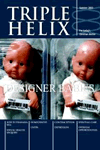New Genetics White Paper
A new government white paper suggests that all newborn babies could in future be screened for a full genetic profile, which would form part of their medical records. Health Secretary John Reid said that the government's vision was 'for the NHS to lead the world in taking maximum advantage of the safe, effective and ethical application of the new genetic knowledge'. He promised £50million for investment on new initiatives. The Human Genetics Commission and the National Screening Committee will be asked to report on the ethical, social, scientific, economic and practical considerations by the end of 2004. The paper can be found at www.doh.gov.uk/genetics/whitepaper.htm. (The Times 2003; 25 June:8)
Chinese orphans
There are over three million children in Chinese orphanages, mainly girls, and most victims of a population control policy that limits most couples to one child. Adoption into Chinese families is rare due to cultural, legal and financial barriers; and yet only 10,000 get adopted overseas each year, of which 3,500 go to Britain. British adopting couples are attracted by the relatively good health of Chinese children and the low cost (usually £10-12,000). This works out cheaper than IVF assuming a 20% success rate and £2,500 cost per cycle. (The Times 2003; 16 May:8)
Dutch Utopia?
Teenage pregnancy rates in England and Wales are four times that of the Netherlands, a fact often put down to the Dutch having more open attitudes to sex and earlier explicit sex education. These beliefs are hotly disputed in a new publication, Deconstructing The Dutch Utopia, published by the Family Education Trust (available on www.famyouth.org). Dutch Sociologist author Dr Joost van Loon found that, contrary to claims made by UK family planning agencies, sex education in Dutch primary and secondary schools is not more explicit and neither does it start at younger ages than in Britain. Rather Dutch parents and school governors are given more control over what is taught and family links in the Netherlands are far stronger, with British children five times more likely to live in households headed by lone parents. He further notes that teenage extra-marital sex and pregnancy are socially frowned upon and that welfare benefits for teenage mothers are low.
Free condoms to under 16s
Leading sexual and reproductive health agency Marie Stopes International UK is offering free condoms to 11-15 year-olds on its sexual health website www.likeitis.org.uk. The initiative came as an independent survey commissioned by the organisation and featured in the March 2003 edition of Britain's best-selling girls' magazine Sugar revealed that over 50% of 11-15 year-olds were unaware that using condoms could prevent HIV/sexually transmitted infections (STIs).
Partial birth abortion ban
The US Congress voted 282-139 on 3 June to ban partial birth abortion, whereby a late term baby is removed feet first vaginally after puncturing and aspiration of the partially delivered skull. President Bush is expected to support the bill and has said it 'will help build a culture of life in America'. Pro-abortion groups claim that the ban is unconstitutional and intend to challenge the ruling in the Supreme Court. (CNN, 4 June)
Most doctors oppose euthanasia
Two major opinion polls have shown that most British doctors still oppose euthanasia. A joint survey of 3,000 doctors by Hospital Doctor and the Nuffield Trust showed that 57% were opposed to legalising the practice. (Hospital Doctor 2003; 13 March:3) In May a major survey of 986 doctors via the website doctors.net revealed that 75% of all doctors and 100% of palliative care specialists would refuse to participate in euthanasia even if it were legalised. BMA Ethics committee chairman Michael Wilks said that BMA policy was to oppose euthanasia and assisted suicide 'for the time being'.
Suspended - guilty until proven innocent?
About 100 doctors in the UK are currently suspended from their employment mostly for whistle-blowing, disputes over private practice and for challenges to trust policy. Complaints by patients account for just 2.5% of suspensions and about 86% of suspended doctors are exonerated. Hospitals reinstate 60% of male consultants and 40% of female consultants once their names have been cleared with the remainder being offered compensation. The Suspended Doctors Group, run by the Society of Clinical Psychiatrists, offers advice and support. For more information phone 01725 513367. (Hospital Doctor 2003; 17 April:28)
Lucrative organ trade
Organ harvesting for the black market is most prevalent in Turkey, India and Central and Eastern Europe. Kidneys, lungs, pieces of liver, corneas, bones and heart valves are all available for purchase with kidneys yielding £1,500 for the donor but up to £150,000 for the broker. (The Times 2003; 27 May:13)
Cloned mule
Idaho Gem, the first cloned mule, was born on 4 May at the University of Idaho, USA. DNA from mule foetal cells cultured in a laboratory since 1998 was placed into an enucleated horse egg. This was the only surviving mule from 113 attempts, only eight of which resulted in pregnancies beyond eight weeks. (The Times 2003; 30 May:13)
When life begins in America
Nearly half of all Americans believe that life begins at conception according to a Newsweek Survey. 46% believe that life begins at conception, whilst a further 12% cite implantation. However 49% considered it acceptable for IVF clinics to destroy human embryos with the consent of the parent. (SPUC Digest 2003; 2 June)
Ectopics on Levonelle
Taking Levonelle 2 (the morning after pill) may put the user at increased risk of ectopic pregnancy, according to an editorial in Trends in Urology Gynaecology and Sexual Health. The increased risk is thought to be small and a causal association between the drug and ectopic pregnancy is not proven. The Medicines Control Agency data of 12 ectopics out of 201 pregnancies (5.9%)following failure of the drug, is thought to be an inaccurate assessment as either event might be under-reported. The mechanism of action of the morning after pill has yet to be determined although altered tubal motility may be a factor. (TUGSH 2003; 8(3):5-6)































